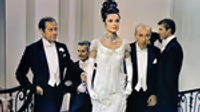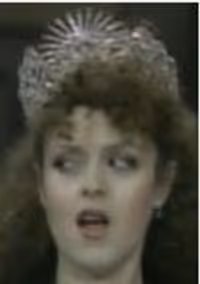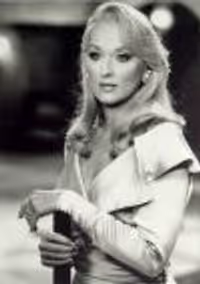"'FOSSE/VERDON' COMING TO FX"
#450FOSSE/VERDON
Posted: 5/25/19 at 5:40pm
What really lessened the impact of Gwen's threat with the quarter was that pay phones were only a dime at the time. I couldn't stop thinking that. lol
bk
Broadway Legend Joined: 7/20/03
#451FOSSE/VERDON
Posted: 5/25/19 at 9:22pm
BWAY Baby2 said: "Owen22
Send PM
Profile
Broadway Legend
joined:2/24/11
FOSSE/VERDON#448
Posted: 5/25/19 at 4:57am
bk said: "BWAY Baby2 said: "As big a deal that Liza was in Chicago- it was not that hot a ticket- I saw it with Liza as a kid- used to go to matinees every Saturday with a friend- and we got tickets to Chicago right at the box office the day of the performance- never bought tickets in advance in those days as a 13 year ole- except for Funny Girl- which never had day of tickets and when we found out Barbra was leaving- got two tickets for November right before her exit. So as much as a big deal is being made of Liza in Chicago- it was not a Hello, Dolly sized hit when Liza appeared- I remember getting a pretty good seat- though at 13- I did not understand it, I must admit. It went over my head- as some of the shows did then- but I must say that most of the shows I did see were very comprehensible to me."
You know, math isn't my strong suit, but you do understand you're telling people you were thirteen in 1975 when you saw Chicago. So, let me just understand this - you bought tickets to see Barbra before she left Funny Girl in December of 1965. Which would make you three. So, just picturing this in my head - you toddled up to the box-office and got a nice seat to see Barbra when you were three? Does not compute. So please do explain this to everyone. I, for one, look forward to solving this enigmatic puzzle."
SORRY OWEN- I DID NOT DO THE MATH- I wrote this off the top of my head and I guess my memories are not the greatest. I saw Funny Girl- Flora The Red Menace- Mame -Sweet Charity- Cabaret - Roar OF The Greasepaint- which I did not at all understand- Drat The Cat- The Price- did not understand it- The Great White Hope- did not understand it- Skyscraper, The Impossible Years- Wait Until Dark- I could go on and on....when I went to Broadway everySaturday matinee with a friend- I am now 67- so I guess I was around 13 and in seventh grade. I forgot that Chicago came later- and so did a lot of other classic shows- like Sunday In The Park with Mandy and Bernadette- came later. I did not fact check- but regardless- I DID see these shows and am not talking out of my a>>, Sorry for giving you that impression- My memories from so many years ago got confused- sorry- but I am for real. Have been a theater fan since I was a kid- and still am here in Atlanta where I see everything I can- though strangely enough I did miss The Prom at the Alliance Theater- found out about it a few weeks before it closed and it was a tough ticket to get- and I though it sounded a bit dumb- and now I am thinking of making a special trip to NY to see it- one of my theater mistakes- and hopefully to be rectified before it closes- I do have tickets too Tootsie, Hadestown and Moulin Rouge beginning on October 22- A Tuesday- and the last performance of Prom seems to be October 20 unless they extend it. And I do not like to visit family for more than a couple of days- so I will see what happens.
And sorry for my dates confusion- I guess it all comes out a blur unless I sit down and actually look up the dates of these shows to put them in order of seeing them."
Not sure who Owen is - you're responding to my post. I figured your memory was hazy - it happens at our age :)
#452FOSSE/VERDON
Posted: 5/26/19 at 12:02am
Actually, I thought it was a nickel she was holding up......didn’t rewind to double check though
#453FOSSE/VERDON
Posted: 5/26/19 at 12:24am
girlcop said: "Actually, I thought it was a nickel she was holding up......didn’t rewind to double check though"
She is indeed holding a nickel, which was the cost of a payphone in 1975. It went up to a dime in 1979. 
#454FOSSE/VERDON
Posted: 5/26/19 at 1:14am
cknick said: "Any reviews from anyone who has read the book? I just got my copy today and can't wait to dig in once the show finishes."
I read the book a few years ago. It's fascinating, thorough, and very dark. I really think the tone that several people have complained about in the show -- along with several of the incidents that people have complained about -- comes straight out of the book. It's not the portrait of a talented charmer with a few weaknesses. It's a portrait of a very damaged, insecure, controlling, and often exploitative man who had tons of talent and some charm.
bear88
Broadway Legend Joined: 4/26/16
#455FOSSE/VERDON
Posted: 5/26/19 at 1:46am
I haven't read the book and am now curious to do so. But the thing about All That Jazz, as much as I like the film, is that it really does paint Fosse in a sympathetic light. He's more of a brilliant, self-destructive cad than a nasty guy. The film is self-lacerating in many ways that felt startling when I first saw it, but it's still a romanticized portrayal of a charmer who knows his faults.
Sam Rockwell's portrayal is no fun because his Fosse is more of an abusive, insecure, depressive jerk than anything else. What was interesting about this episode, at least to me, was that in the midst of everything, Fosse makes two key creative decisions about Chicago that worked out brilliantly - and paid off, ironically, long after his death. I don't know about the accuracy of what's portrayed, and Gwen Verdon's outburst over "Nowadays" seemed overwrought, out of character, and driven by a culmination of resentments for dramatic purposes of the episode and series.
But that said, unless those two decisions were invented, they are both examples of Fosse's genius in a series that has often showed him awfully dependent on Verdon's creative input.
bk
Broadway Legend Joined: 7/20/03
#456FOSSE/VERDON
Posted: 5/26/19 at 1:48am
BrodyFosse123 said: "girlcop said: "Actually, I thought it was a nickel she was holding up......didn’t rewind to double check though"
She is indeed holding a nickel, which was the cost of a payphone in 1975. It went up to a dime in 1979.
"
Please provide a working link for this statement. As far as I know, the cost of a payphone call was a dime from the late 50s until 1984, when it went up to a quarter. I don't believe you could make a nickel phone call from any payphone in the United States in 1975. I'm happy to be proven wrong, but after a bit of time on Google, I can find no such corroboration.
ScottyDoesn'tKnow2
Broadway Legend Joined: 1/22/14
#457FOSSE/VERDON
Posted: 5/26/19 at 3:37am
This pay phone conversation reminds me of an episode of Mama's Family where they bought a brand new answering machine and the family kept arguing what to record for their "We're not home right now" message on the machine and Mama finally had enough and just took over and yelled "It's your dime! Spill it!" Yes, I know the show was shot in the 1980s so it's not really helpful to determine how much pay phones cost in 1974-1975.
#458FOSSE/VERDON
Posted: 5/26/19 at 5:30am
Bettyboy72 said: "What really lessened the impact of Gwen's threat with the quarter was that pay phones were only a dime at the time. I couldn't stop thinking that. lol"
I too thought it was an anachronistic quarter.
But I am 65 and I don't recall EVER putting a nickel in a pay phone. Seems like it was already a dime by the time I was able to reach the slot. Of course, I could be wrong.
#459FOSSE/VERDON
Posted: 5/26/19 at 5:36am
MCfan2 said: "cknick said: "Any reviews from anyone who has read the book? I just got my copy today and can't wait to dig in once the show finishes."
I read the book a few years ago. It's fascinating, thorough, and very dark. I really think the tone that several people have complained about in the show -- along with several of the incidents that people have complained about -- comes straight out of the book. It's not the portrait of a talented charmer with a few weaknesses. It's a portrait of a very damaged, insecure, controlling, and often exploitative man who had tons of talent and some charm."
I've now read about a fifth of the book and I think the biographer has the descriptive powers of a good novelist. The portrait of Fosse is certainly complex and he seems to be less and less charming as he becomes more and more powerful within the industry, directing in addition to choreographing. Amphetamines get a lot of the blame.
Gwen Verdon receives high praise but the impression the series gives that Verdon created half or more of Fosse's inventions is not in the book. She is admirably loyal, protects his vision, polishes a lot of movement and often finds more helpful ways to convey Fosse's wishes to the dancers. But so far, at least, Verdon is still portrayed as an enormously talented acolyte of Jack Cole and Fosse, NOT the "real" genius behind the throne. On the other hand, the biographer praises her dancing in the highest possible terms.
#460FOSSE/VERDON
Posted: 5/26/19 at 8:15am
The Wikipedia page on payphones says, "On average, pay phone calls generally cost 5¢ into the 1950's and 10¢ until the mid 1980's. Rates standardized at 25¢ during the mid 1980's to early 1990's."
I interpret this to mean that it was only a nickel until it changed to a dime sometime during the 50s. Then it remained a dime until the 80s.
Payphones
#461FOSSE/VERDON
Posted: 5/26/19 at 1:18pm
I'm not so sure that F/V shows Verdon as the real genius behind the throne. It shows her as having great interpretive and communicative gifts and good connections in the theater, all of which she did have, and all of which Fosse put to use. But it still shows the choreography, the direction, and the ultimate creative decisions as being all his. The "Nowadays" incident (again, taken right out of the Wasson biography, though they've consolidated and rearranged some things) shows that. Gwen begs and rants and threatens, but Bob makes the decision.
If I remember correctly, the only step Gwen has actually choreographed in the entire series was that little leg hitch in "Whatever Lola Wants." She's enhancing, not creating.
#462FOSSE/VERDON
Posted: 5/26/19 at 7:45pm
^^^ Fair enough. What's most amazing to me so far (and what I didn't completely get from the series) is that Verdon was ultimately the costumer for the film of CABARET!
Per the book, the Germans were so anxious to bury their Nazi past, they banished all real artifacts from the Nazi period to backrooms. What the credited German designer gave Fosse were all fakes, not really the clothes of 1930s Germany, and Fosse found them unusable.
Verdon costumed the movie by combing through thrift stores all over Germany to find authentic pre-war apparel. The colorful kimono that Minnelli wears in the film came from Verdon's own closet.
***
I remain astonished that so many people found the scene "overwrought" where Verdon's 11 o'clock number became a duet. I don't think those posters understand what a big deal that must have been! Perhaps they should consider that Verdon's introduction to the material was a non-musical film version of the source play. The film was called Roxie Hart, not Roxie and Velma. In fact, if I am reading Wikipedia correctly, Velma is a minor character in the movie; Velma in the musical seems a composite of several female characters in the film.
Again, Chicago was to be Verdon's comeback and, likely, swan song. Rivera was eight years younger and already doing the heavy lifting in the show's dances. Rivera already had the opening number as a solo and was a much stronger singer than Verdon. Verdon had to have known that "All That Jazz" was a bigger solo than her own first number, "That Funny Hubby of Mine". Bigger, really, than any of Verdon's solos, with the possible exception of "Roxie".
Had Verdon done "Nowadays" as a solo, it would have gone a long way to reminding the audience that SHE was the headliner. Of course, Fosse was right to make the change; but Verdon had just sung the number for those assembled and it had been written for her. She was delighted and expected others to share that delight.
If anything, her reaction in the TV show was subdued, IMHO.
#463FOSSE/VERDON
Posted: 5/26/19 at 10:08pmIt’s baffling how everyone seems to forget Roxie (Gwen Verdon) sings the entire “Nowadays” song as a solo before it goes into the duet dance section with Velma. Roxie has the number entirely for herself before she shares it with Velma, where they both basically repeat the same lyrics heard earlier.
#464FOSSE/VERDON
Posted: 5/26/19 at 10:43pm
BrodyFosse123 said: "It’s baffling how everyone seems to forget Roxie (Gwen Verdon) sings the entire “Nowadays” song as a solo before it goes into the duet dance section with Velma. Roxie has the number entirely for herself before she shares it with Velma, where they both basically repeat the same lyrics heard earlier. "
This is what I was thinking when the scene aired. They seemed to completely ignore the fact that Roxie does still begin the number as a solo.
bk
Broadway Legend Joined: 7/20/03
#465FOSSE/VERDON
Posted: 5/26/19 at 10:49pm
BrodyFosse123 said: "It’s baffling how everyone seems to forget Roxie (Gwen Verdon) sings the entire “Nowadays” song as a solo before it goes into the duet dance section with Velma. Roxie has the number entirely for herself before she shares it with Velma, where they both basically repeat the same lyrics heard earlier."
It's equally amazing that you don't acknowledge that you were wrong about the cost of a payphone call in 1975, even though several people here corrected your misinformation.
#466FOSSE/VERDON
Posted: 5/26/19 at 11:11pm
BrodyFosse123 said: "girlcop said: "Actually, I thought it was a nickel she was holding up......didn’t rewind to double check though"
She is indeed holding a nickel, which was the cost of a payphone in 1975. It went up to a dime in 1979.
"https://www.nytimes.com/1984/06/13/nyregion/25-pay-phone-calls-part-of-rises-approved-for-new-york-telephone.html
Same Pay Call Toll Since 1951
A call from a pay phone, whether by a dashing commuter, a traveling salesman or a person with no phone of his own, has been 10 cents in New York since 1951.
Before that, the pay call had been a nickel since 1906, when the first pay phone was introduced in New York City.
A Director
Broadway Legend Joined: 12/18/07
#467FOSSE/VERDON
Posted: 5/27/19 at 1:57am
Chicago, the play by Maurine Watkins, opened on Broadway on Dec. 30, 1926. It was directed by George Abbott and ran for 172 performances. It predates The Front Page by two years. In the play, Velma is a minor character. In the play, there is a reporter named Jake. It's a large role than Velma.
Years ago, I saw Roxie Hart when it was shown on my local PBS station. I'm not sure, but I think Velma remains a minor character.
Chicago, the play, was published in 1927 by Alfred Knopf.
#468FOSSE/VERDON
Posted: 5/27/19 at 4:14am
BrodyFosse123 said: "It’s baffling how everyone seems to forget Roxie (Gwen Verdon) sings the entire “Nowadays” song as a solo before it goes into the duet dance section with Velma. Roxie has the number entirely for herself before she shares it with Velma, where they both basically repeat the same lyrics heard earlier."
But, Brody, with respect, that's still not the same as "Rose's Turn", "Fifty Percent", "If He Walked into My Life" or even "Send in the Clowns". Add to that the fact that, IIRC, Verdon wasn't even in most of the big dance numbers ("All That Jazz", "The Cell Block Tango" or "Razzle Dazzle"![]() except for her specialty turn, "Roxie", in which she delivers a monologue (brilliantly, if you ask me) more than she dances.
except for her specialty turn, "Roxie", in which she delivers a monologue (brilliantly, if you ask me) more than she dances.
And anyway, in the scene from the series that showed her reaction, she didn't know how the finished number would turn out. She only knew that her 11 o'clock solo was to be shared with her younger co-star.
IMHO and without knowing the lady, I think it had to be a bitter pill, and something Fosse wouldn't have even suggested in the shows when she was in her prime.
#469FOSSE/VERDON
Posted: 5/27/19 at 4:23am
Who knows how much of it is real or not (I’m hoping it’s only in the details but the themes broadly are real), but it is so satisfying to have a backstage Broadway drama of real, iconic creatives, shows and films. It’s like we have the real life version of Smash - and I can’t imagine this very very niche show will ever be repeated again. Williams’ desperation, insecurity and breakdowns are chilling.
I love that we have a long conversation on here about whether it’s a nickel or a dime lol.
#470FOSSE/VERDON
Posted: 5/27/19 at 5:24am
qolbinau, I am reading the book and so far, almost everything in the TV series is supported by the source biography, at least in spirit. East Hampton becomes Southhampton on TV and that sort of thing, but nothing that isn't essentially true in spirit and based on the writer's exhaustive research.
#471FOSSE/VERDON
Posted: 5/27/19 at 10:15am
qolbinau said: " It’s like we have the real life version of Smash - and I can’t imagine this very very niche show will ever be repeated again. Williams’ desperation, insecurity and breakdowns are chilling.
Agreed! And it's great to have an in depth sequence about a particular project where the dramatization of their personal and professional dynamic plays out in the product. One challenge and weakness of the show has been how quickly it has had to move through years and material. Often, we've only gotten to see glimpses of how they worked together and how the personal and professional dynamics played out. I think that's why this one works so well.
#472FOSSE/VERDON
Posted: 5/27/19 at 10:59amI think Michael Bennett would make a great subject for a miniseries if, by some miracle, they decide to do another show like this.
#473FOSSE/VERDON
Posted: 5/27/19 at 12:11pm
The track release that will coincide with tomorrow's finale is "Mr. Bojangles." If I didn't know better, I'd say that was Lin-Manuel Miranda's voice... https://www.e-onkyo.com/music/album/wnr075679845566/
#474FOSSE/VERDON
Posted: 5/27/19 at 12:12pm
NOWaWarning said: "I think Michael Bennett would make a great subject for a miniseries if, by some miracle, they decide to do another show like this."
Bennett was solely associated with Broadway unlike Bob Fosse who was known as a major Oscar winning Hollywood film director (only 5 movies; nominated for Best Director 3 times; winning 1 Best Director Oscar — this breakdown is insane) plus considered one of Broadway’s major director/choreographers. Adding Gwen Verdon to his story added extra layers to this limited series FOSSE/VERDON.
Michael Bennett’s only true contribution to anything historical is A CHORUS LINE. DREAMGIRLS wasn’t as revolutionary though it was for its Broadway staging. His career isn’t all that fascinating to the average civilian unless they are obsessed with Broadway. FOSSE/VERDON brought interest due to Bob Fosse’s roster of film, dance and Broadway history. Gwen’s story brought interest due to her association to him. On her own, no series would ever have been created just about her.
Videos













